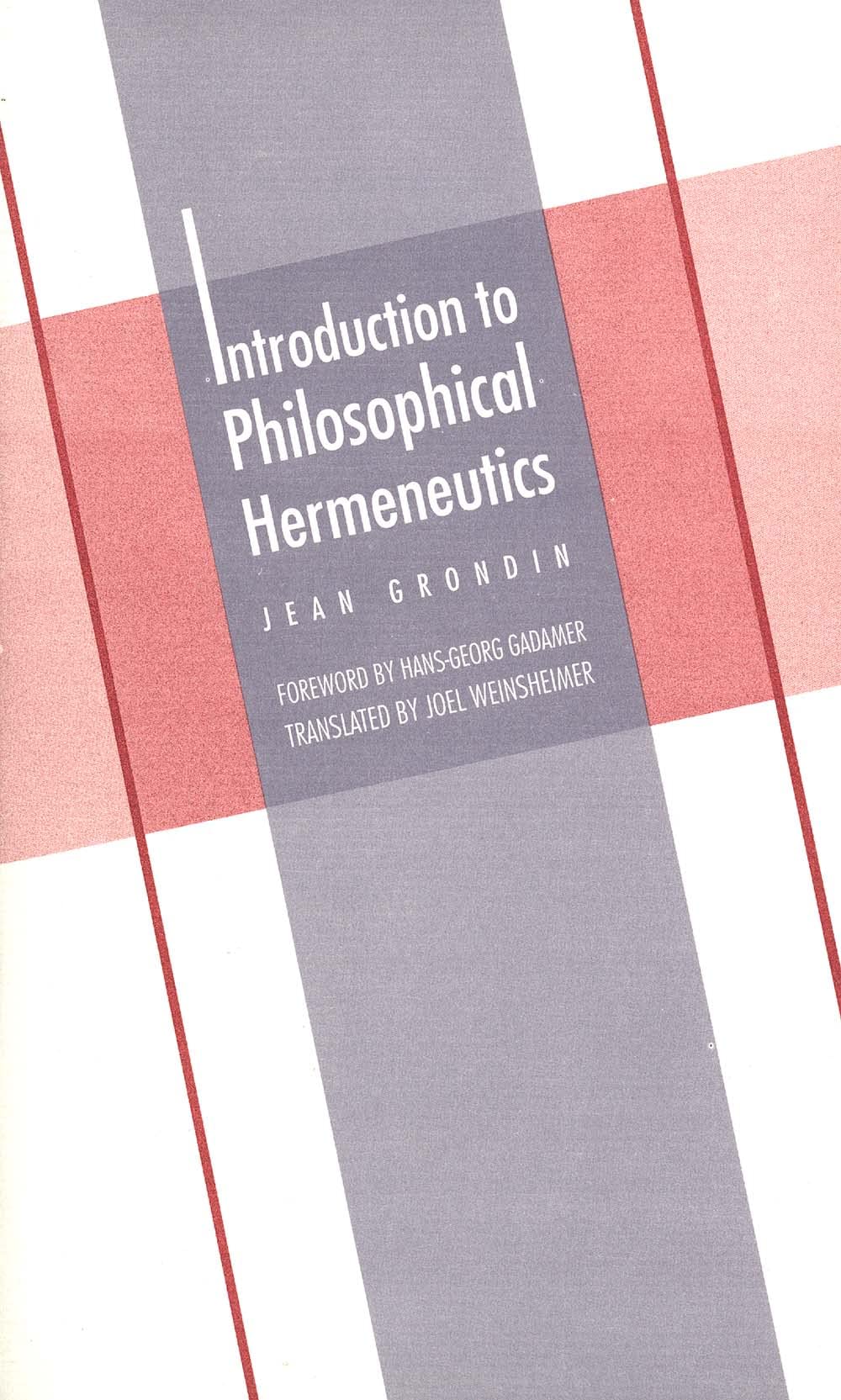
Title

Introduction to Philosophical Hermeneutics (Yale Studies in Hermeneutics),Used
Delivery time: 8-12 business days (International)
In this wideranging historical introduction to philosophical hermeneutics, Jean Grondin discusses the major figures from Philo to Habermas, analyzes conflicts between various interpretive schools, and provides a persuasive critique of Gadamer's view of hermeneutic history, though in other ways Gadamer's Truth and Method serves as a model for Grondin's approach.Grondin begins with brief overviews of the prenineteenthcentury thinkers Philo, Origen, Augustine, Luther, Flacius, Dannhauer, Chladenius, Meier, Rambach, Ast, and Schlegel. Next he provides more extensive treatments of such major nineteenthcentury figures as Schleiermacher, Bckh, Droysen, and Dilthey. There are full chapters devoted to Heidegger and Gadamer as well as shorter discussions of Betti, Habermas, and Derrida. Because he is the first to pay close attention to preRomantic figures, Grondin is able to show that the history of hermeneutics cannot be viewed as a gradual, steady progression in the direction of complete universalization. His book makes it clear that even in the early period, hermeneutic thinkers acknowledged a universal aspect in interpretationthat long before Schleiermacher, hermeneutics was philosophical and not merely practical. In revising and correcting the standard account, Grondin's book is not merely introductory but revisionary, suitable for beginners as well as advanced students in the field.
By changing our most important processes and
products, we have already made a big leap forward. This ranges from the
increased use of more sustainable fibers to the use of more
environmentally friendly printing processes to the development of
efficient waste management in our value chain.
⚠️ WARNING (California Proposition 65):
This product may contain chemicals known to the State of California to cause cancer, birth defects, or other reproductive harm.
For more information, please visit www.P65Warnings.ca.gov.
Shipping & Returns
Shipping
We ship your order within 2–3 business days for USA deliveries and 5–8 business days for international shipments. Once your package has been dispatched from our warehouse, you'll receive an email confirmation with a tracking number, allowing you to track the status of your delivery.
Returns
To facilitate a smooth return process, a Return Authorization (RA) Number is required for all returns. Returns without a valid RA number will be declined and may incur additional fees. You can request an RA number within 15 days of the original delivery date. For more details, please refer to our Return & Refund Policy page.
Shipping & Returns
Shipping
We ship your order within 2–3 business days for USA deliveries and 5–8 business days for international shipments. Once your package has been dispatched from our warehouse, you'll receive an email confirmation with a tracking number, allowing you to track the status of your delivery.
Returns
To facilitate a smooth return process, a Return Authorization (RA) Number is required for all returns. Returns without a valid RA number will be declined and may incur additional fees. You can request an RA number within 15 days of the original delivery date. For more details, please refer to our Return & Refund Policy page.
Warranty
We provide a 2-year limited warranty, from the date of purchase for all our products.
If you believe you have received a defective product, or are experiencing any problems with your product, please contact us.
This warranty strictly does not cover damages that arose from negligence, misuse, wear and tear, or not in accordance with product instructions (dropping the product, etc.).
Warranty
We provide a 2-year limited warranty, from the date of purchase for all our products.
If you believe you have received a defective product, or are experiencing any problems with your product, please contact us.
This warranty strictly does not cover damages that arose from negligence, misuse, wear and tear, or not in accordance with product instructions (dropping the product, etc.).
Secure Payment
Your payment information is processed securely. We do not store credit card details nor have access to your credit card information.
We accept payments with :
Visa, MasterCard, American Express, Paypal, Shopify Payments, Shop Pay and more.
Secure Payment
Your payment information is processed securely. We do not store credit card details nor have access to your credit card information.
We accept payments with :
Visa, MasterCard, American Express, Paypal, Shopify Payments, Shop Pay and more.
Related Products
You may also like
Frequently Asked Questions
- Q: What is the main focus of 'Introduction to Philosophical Hermeneutics'? A: The book provides a historical introduction to philosophical hermeneutics, discussing major figures in the field from Philo to Habermas, and analyzing the conflicts between various interpretive schools.
- Q: Who is the author of this book? A: The author of 'Introduction to Philosophical Hermeneutics' is Jean Grondin.
- Q: What are the key themes explored in this book? A: Key themes include the evolution of hermeneutics, critiques of Gadamer's interpretations, and the significance of pre-Romantic thinkers in the history of interpretation.
- Q: What is the publication date of this book? A: The book was published on February 27, 1997.
- Q: What is the binding type of this book? A: The book is available in paperback binding.
- Q: How many pages does 'Introduction to Philosophical Hermeneutics' have? A: The book has a total of 252 pages.
- Q: Is this book suitable for beginners? A: Yes, the book is suitable for both beginners and advanced students in the field of hermeneutics.
- Q: What category does this book fall under? A: This book falls under the category of Epistemology.
- Q: Does the book include discussions on contemporary figures? A: Yes, the book includes discussions on contemporary figures such as Habermas and Derrida.
- Q: What makes this book different from other introductions to hermeneutics? A: Grondin's book is not only introductory but also revisionary, providing new insights and correcting standard accounts of hermeneutic history.
